The Intel Core i7-8086K Review
by Ian Cutress on June 11, 2018 8:00 AM EST- Posted in
- CPUs
- Intel
- Core i7
- Anniversary
- Coffee Lake
- i7-8086K
- 5 GHz
- 8086K
- 5.0 GHz
Benchmarking Performance: CPU Legacy Tests
Our legacy tests represent benchmarks that were once at the height of their time. Some of these are industry standard synthetics, and we have data going back over 10 years. All of the data here has been rerun on Windows 10, and we plan to go back several generations of components to see how performance has evolved.
All of our benchmark results can also be found in our benchmark engine, Bench.
3D Particle Movement v1
3DPM is a self-penned benchmark, taking basic 3D movement algorithms used in Brownian Motion simulations and testing them for speed. High floating point performance, MHz and IPC wins in the single thread version, whereas the multithread version has to handle the threads and loves more cores. This is the original version, written in the style of a typical non-computer science student coding up an algorithm for their theoretical problem, and comes without any non-obvious optimizations not already performed by the compiler, such as false sharing.
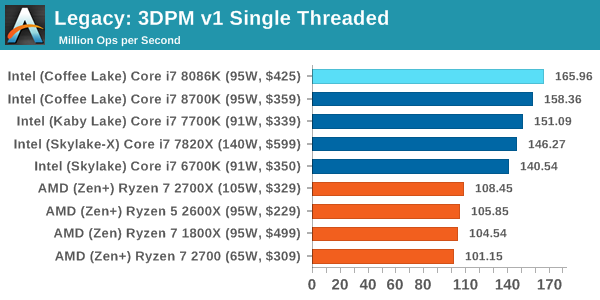
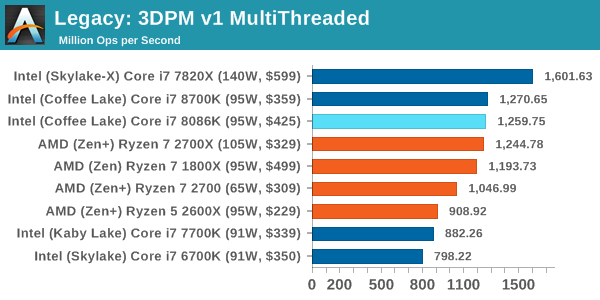
CineBench 11.5 and 10
Cinebench is a widely known benchmarking tool for measuring performance relative to MAXON's animation software Cinema 4D. Cinebench has been optimized over a decade and focuses on purely CPU horsepower, meaning if there is a discrepancy in pure throughput characteristics, Cinebench is likely to show that discrepancy. Arguably other software doesn't make use of all the tools available, so the real world relevance might purely be academic, but given our large database of data for Cinebench it seems difficult to ignore a small five minute test. We run the modern version 15 in this test, as well as the older 11.5 and 10 due to our back data.
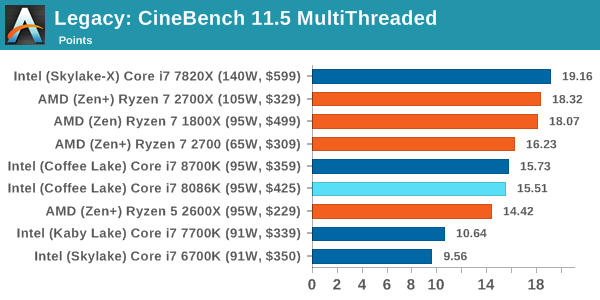
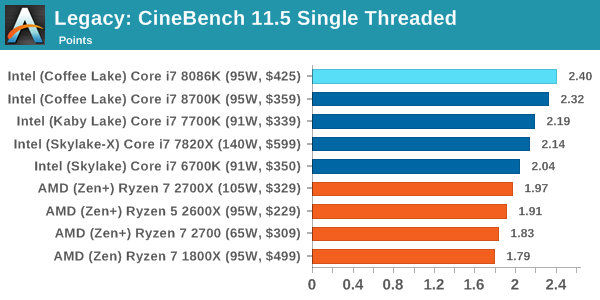
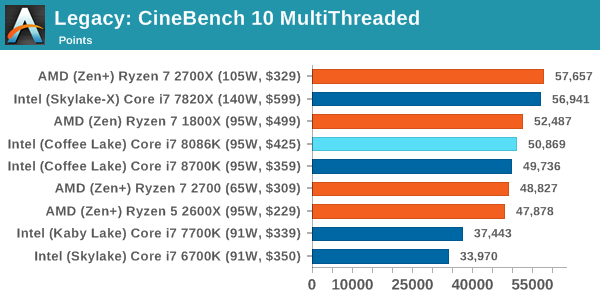

x264 HD 3.0
Similarly, the x264 HD 3.0 package we use here is also kept for historic regressional data. The latest version is 5.0.1, and encodes a 1080p video clip into a high quality x264 file. Version 3.0 only performs the same test on a 720p file, and in most circumstances the software performance hits its limit on high end processors, but still works well for mainstream and low-end. Also, this version only takes a few minutes, whereas the latest can take over 90 minutes to run.
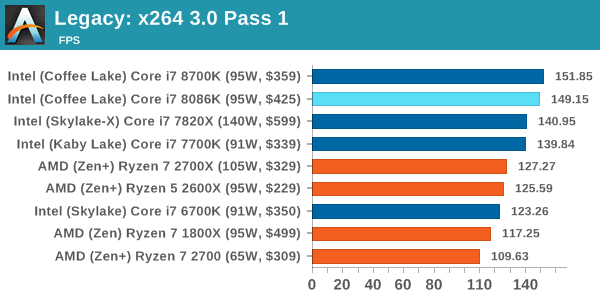
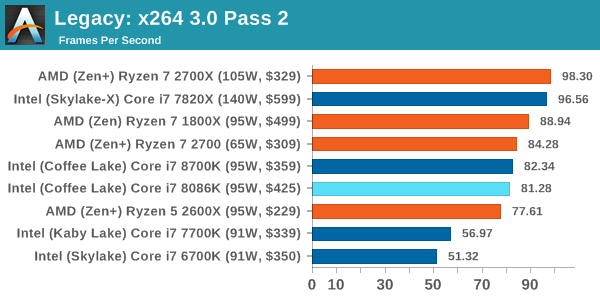










111 Comments
View All Comments
mkaibear - Tuesday, June 12, 2018 - link
"Total flop"I suggest benchmarking the CPU in your phone against this CPU and try again.
SanX - Tuesday, June 12, 2018 - link
They mostly serve different purposes and apps and have different TDP. But if you restrict consumption power of Intel processors to the same one of mobile processors then in the same apps it's not clear in advance which one will win.Time for ARM to look at the server and supercomputers markets.
iranterres - Monday, June 11, 2018 - link
HAHA. Intel once again trying to fool some people and appeasing the fanboys with something worthless and expensive.xchaotic - Tuesday, June 12, 2018 - link
So are the regular i7-8600K unable to run all core 5GHz? If so, what't the max stable freq for a non-binned i7-8600K? Personally I went for an even lower/cheaper i5-8400 CPU, but I see why some people prefer to be running max speed all the time...Rudde - Tuesday, June 12, 2018 - link
I assume you mean the i7-8700k.There is a phenomenon called 'the silicon lottery.' Basically, when you buy an i7-8700k, you can't know the max stable frequency. It could max out at 5.2GHz or it could only reach 4.7GHz before going unstable. The thing is, you can't know what you'll end up with.
This brings us to the i7-8068k. The i7-8068k is pretty much guaranteed to have a max stable frequency above 5GHz. Of course, this matters only when overclocking.
Bradyb00 - Tuesday, June 12, 2018 - link
Is it a lower temp than a 8700k for a given multiplier though? i.e. both 8700k and 8086k at 46x which is cooler? 8700k obviously has to be averaged as not everyone is lucky with the silicon lottery.Presumption is the 8086k will run cooler on average due to the better binning.
In which case I'm happy to pay more to save some degrees in my wee itx build
Lolimaster - Tuesday, June 12, 2018 - link
Why not simply pick the Ryzen 5 2600, same thing with actual lower temps from using high quality solder...$189
TheinsanegamerN - Monday, June 18, 2018 - link
Depends on the use case. For pure gaming, I'd stick with intel, which is a bit faster now and, if history is any indication, will hold up a LOT better for gaming in 5 years then the AMD chip will.Especially if you run games or emulators dependent on IPC (like PCSX2) the intel chip will perform a lot better then the AMD chip.
There is also the memory controller. Ryzen 2000 improved, but intel's controller is still superior, and that matters for things like RTS games that consume memory bandwidth like black holes consume stars.
Stuka87 - Tuesday, June 12, 2018 - link
Props to Asrock for providing the system so that you could get us stuff so quickly Ian. Not sure why everybody is complaining about the system and cooling that was used. The system was loaned to you so that you could get us numbers fast, which personally I am happy about. Thanks for your hard work Ian!El Sama - Tuesday, June 12, 2018 - link
This is quite the premium cost for a small increase in frequency that should be close to what you get to a 8700k OCed, an interesting offering regardless.